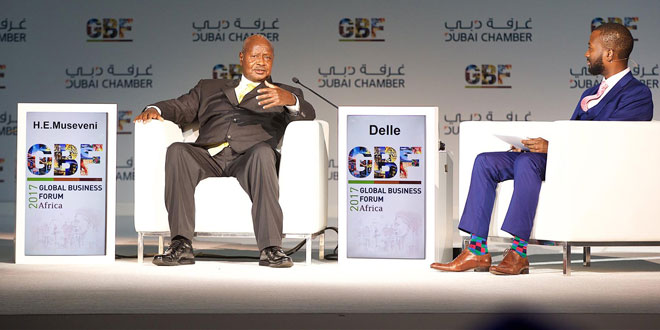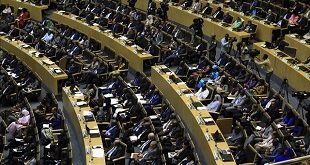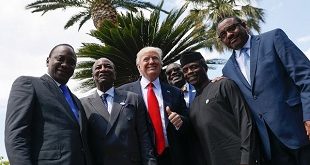
Africa’s governance challenges are not new. They have endured 278 changes of government over 60 years. Every new government has come to power promising to solve them. Each one of them, with the possible exception of post genocide Rwanda, has governed and left power being accused of practicing them. Note: the factors that have allowed Rwanda to make this gigantic leap in governance are rare to find and difficult to recreate.
It is understandable that ambitious politicians like Kizza Besigye and Bobi Wine claim that somehow by sheer strength of their personality and political will they can change the way Uganda is governed. That is political sloganeering with little analytical value. It can appeal to the hordes on the streets but not anyone who cares to think. It is possible they say these things in earnest. But that is because they are ignorant or deluded or both.
Neither Besigye nor Bobi Wine has any demonstrable skills that can fundamentally alter the governance strategies of Uganda. Neither are they more patriotic than Museveni and his confederates. Precisely because these governance challenges have deep structural roots, they are quite obdurate with limited room for agency. Let us not forget that Museveni came to power promising “fundamental change” and has ruled by the slogan “no change.”
Museveni appreciates the value of manufacturing. He has answered it by reorienting the budget: public spending has been shifted from consumption expenditure to investment in infrastructure – Standard Gauge Railway, dams, transmission and distribution lines, roads, expressways, airports, water treatment plants etc. – plus making a strong case for low electricity tariffs. These infrastructures are absolutely necessary but not sufficient to stimulate the necessary investment in manufacturing.
Transformative manufacturing projects require capital investments far in excess of what private capital in poor countries can marshal. And they have a long gestation period between the time investment is made and the time they become profitable. So we need the state in Uganda to play the role of investment banker by mobilising long term savings and making them available to finance long term investments at a cheaper cost.
The state needs also to play the role of surrogate entrepreneur by directly investing in sectors it considers strategic and then luring private capital with tax reliefs, cheap credits and subsidies to join.
For Uganda to do this, it will need to rethink its policy of controlling inflation below 5%. Investment in industry will require monetary expansion, which should shift our inflation target to about 20%. I will discuss who wins and who loses under a tight monetary policy of 5% inflation another day.
The second thing is to overcome Museveni’s blind and often naïve faith in foreign investors. FDI is absolutely vital for growth by complimenting local efforts. But it will not foster our structural transformation. Uganda’s industrial policy should aim to cultivate enterprising nationals to become the captains of our nascent manufacturing industry.
Yet for all their grand standing, Uganda’s opposition is not concerned about these issues. Their exclusive focus on “good governance” only reflects their ignorance of the strategic challenges facing our country on the one hand and their obsessive greed for power on the other.
In spite of the aforementioned limitations of his strategy, Museveni has a much more developed vision of how to grow manufacturing.
His opponents demand that everyone should support them because they criticise Museveni’s failures rather than because of any alternative vision or policies. If one does not capitulate to this demand, they use social media to intimidate, to blackmail and to falsely accuse. I will not yield to such.
amwenda@independent.co.ug
 The Independent Uganda: You get the Truth we Pay the Price
The Independent Uganda: You get the Truth we Pay the Price



Andrew, I challenge you to starting open debates on policies and governance in regard to Uganda and you will be shocked how wrong or naive you are about Ugandans.
Just because you have a government favoured platform to write your personal thoughts, it doesn’t mean the rest of the population is naive. You remind me of a professor who never appreciated his primary or secondary school teachers. And yet at the time they were not even among the best 50 in class. Come university, they performed like the majority.
Now because of money and political influence, they have become the greatest political thinkers in the land. This is the same disease in the NRM which you have signed to and think others need to be thought for. You are wrong Sir Andrew !!
Yeah Andrew you think like i do
I with you on most of the things about the approach to development. However, for you to state that for Africa to develop we need revisiting medieval times is as to say that because my father went to school barefooted so should my son do the same. Times change Andrew and so should we be present towards the current circumstances. For your argument to be valid, state one country that has deteriorated in development because of democracy. Lastly, you so accuse of Dr. Besigye about grandstanding, you’re one of the great grandstanders that I’ve come to know. You take positions that give the impression that maybe he’s a “village chief” yet, I wonder that if stood among your family members that you would win by consensus. I wonder.
Sir John Bagot Glubb (1897-1987), a highly honored British general and historian wrote about the collapsed empires of the past. In his 1978 book The Fate of Empires and the Search for Survival, he described a common pattern fitting the history of some fallen empires. He says empires go through a cycle of stages of start, expand, mature, decline and finally collapse. All these are processes, not occurences so they creep in slowly until fulfillment. Because these debates that appear here are life-and-death issues which we at times unwittingly joke about, it is imperative that we revisit whether Uganda may after all be on an irreversible decline like old age which knows no renewal. While we may say it is still young, it is also good to remember that the wounds it has received in childhood impeded its growth drastically. Start at 1962 then 4 years down the road, Lubiri invasion and deposing of HM Edward Mutesa; resulting in many innocent deaths that were never appeased; 4 years down, Obote overthrown and thereafter deaths uncountable and unaccounted for; in that though the blamed is one Gen Amin, the killers logically look like many parties……8 years on a full-scale invasion of foreign army assisted by exiles who killed,looted and raped; leaving behind such damage as cannot be cured; particularly the rotten moral fibre adopted since then to-date. Only people who left Uganda in 1973 and returned in 1990 know the difference in people’s personality and moral fibre rot. Those who stayed around changed gradually and unknowingly till they became what you see now and still going downhill. Then LRA and consequent attendant atrocities. Post-traumatic stress syndrome resultant from all that blood-letting and bathing….. which the government has not addressed or even acknowledged of its existence is another factor that maybe accounts for these regular murders. So my brother Rajab, it could be that Uganda is old and dying from the mileage regardless of her young age. Otherwise , why are all people not seeing things the same way,despite the love they all claim to have for her. I want you to cogitate on one Gen Leopold Kyanda as an example. The fellow is deployed to extract Ugandans from a burning South Sudan. He hastily assembles a force and enters fighting, gathers Ugandans amidst the firepower of those mad people; rescues many other foreigners whose governments could not manage what Uganda(Gen Kyanda) did and theough fire brings them to Uganda through Nimule. He sorts them according to their origin, Foreigners to a refugee camp and Ugandans to their respective homes. The whole world cheers the man and his force. Then a few months down the road, the good General is involved in a theft that gets him sidelined. Is this the same man? It requires men of women of integrity; preferably Religious leaders of untainted piety to inquire in deep sincere prayer what is wrong and its cure (if there is). There is one thing I know. Uganda cannot be stabilised by a politcian(s)
My cogitation aside, what has all this got to do with the topic at hand?
That you may perhaps be talking of spending time and money for a kidney transplant to a nonagenarian. I at times wonder whether you do your own reading or whether you till now need a translator…. who did his schooling in English from primary school.
I want to think you need to change your dietician for your condition requires a more serious sedative than the cocaine is managing you on. Your laconic application of the queen’s language can only make me your envy. Sad.
If u know what the opposition needs to do to overcome M7 and save Uganda, why don’t you do It? “It is not the critic who counts; not the man who points out how the strong man stumbles, or where the doer of deeds could have done them better. The credit belongs to the man who is actually in the arena, whose face is marred by dust and sweat and blood; who strives valiantly; who errs, who comes short again and again, because there is no effort without error and shortcoming; but who does actually strive to do the deeds; who knows great enthusiasms, the great devotions; who spends himself in a worthy cause; who at the best knows in the end the triumph of high achievement, and who at the worst, if he fails, at least fails while daring greatly, so that his place shall never be with those cold and timid souls who neither know victory nor defeat.”
Theodore Roosevelt
There is nothing wrong in knowing the problem and not being able to take any action to correct that problem. As they say, you do not have to be a chef (cook) to know that the food tastes bad, you just have to have the taste buds. On the other hand M 9 seems to know the problem but does not seem to know the right solution. As for M 7 , the man who thirty years ago seemed to know all the problems, by admission of this very paper, he has become the problem.
M 9 states that “M 7 has a much more developed vision of growing manufacturing”
REALLY
Do you grow manufacturing by ruining co-operative unions , most of which had industries ranging from ginneries , coffee mills, soap and cooking oil industries, ruin a whole manufacturing town in the name of JINJA , ruin and cannibalize NYTIL among many other industries including selling off the Dairy Corporation.
Where and from who are we expecting to get finance for investment when the government owned banks UCB and CO-OPERATIVE bank were bankrupted and sold of as well as the locally owned banks which would look out for the interests of the locals, banks like Greenland and lately CRANE bank – its shortcomings not withstanding,are made to collapse.
cannibalising NYTIL, and you don’t say the railway ejakait? rails I mean.
Our government is like the arsonist who sets a fire and is the first on the scene to fight the fire.
They cannibalized the railways as you say , but are now saying they are the ones who brought railways to Uganda.
And those born post 86, unlike you and I who saw students issued with train passes to travel back home, will believe the narrative
I travelled 3rd class Tororo-Kampala for 2shillings and 20 cents I wasn’t alone. Tororo-Kasese was 4 shillings 10 cents. The train was a mobile town complete with a police station, restaurant, hawkers and even pick-pockets.
“Transformative manufacturing projects require capital investments far in excess of what private capital in poor countries can marshal”
The Chinese found a solution to this. They copy (steal).
The other day in our cigar store, a group of Chinese men walked in and took a look in the humidor cigar storage room.
They took a great interest in the €7000 box of Padron cigars (with 50 limited edition cigars inside), but you see these Chinese do not smoke and only wanted just the empty box excluding the cigars. They paid €4000 for the empty box and left us with the 50 cigars to sell off individually.This box which doubled as a humidor was so beautiful and well made with a white enamel lacquer finish not to mention only 1000 copies were made.
They took the box back to China to copy it. They may not necessarily name the box Padron but even if they did a 20% copy of the original model, it would still be decent.
To compete in manufacturing today, Africa like the Chinese must be prepared to do whatever it takes to step up on the quality.
I would offer my advice to African companies if they have interest.
“Museveni appreciates the value of manufacturing. He has answered it by reorienting the budget: public spending has been shifted from consumption expenditure to investment in infrastructure – Standard Gauge Railway, dams, transmission and distribution lines, roads, expressways, airports, water treatment plants etc”
Appreciates value of manufacturing- after 30 years!!!!!!!!!!!!
I have said it before, that M 7 does not initiate these so called infrastructure projects, which he micro manages , like him personally flying to Japan to go and buy road maintanance equipment, because he wants to improve the infrastructure, but because they provide an easy way to steal public funds. These projects are way above their true value(cost) and you and I know where the massive difference goes. This is exactly what happened with the money $740m I think, just before the 2010 elections, which it is very well known the amount was more than twice what the jets cost on the open market. Was Uganda under any threat at the time from attack?
YOU can not be serious about industrialization when you spend $150m annually on sending high ranking officials and cronies for treatment overseas.
And all these infrastructure projects are done by foreign companies, some even bringing labourers to do the work and the government has not put in place measures to ensure high level of local content. The local manufacturers can not provide steel for instance, because it has been found to be substandard yet it is sold to the locals.
These projects are conceived well in advance, sometimes 10 years before actual works commence, yet government does nothing to prepare local companies and industries to effectively participate, except for companies that are otherwise well connected.
YOU can not mobilise savings when people are paid poorly. And even the “forced” saving they make under schemes like the NSSF are not properly utilised, that is they are not channeled towards investment with a view to creating jobs.
UGANDA has failed to invest, atleast at the government level, in one of the areas that has a very high job multiplier effect, namely housing/construction.
Also, we have to aim at industrialisation from basics, that is mostly using the raw materials that we have. It would have been prudent therefore to target the agro based industries which would suck up and encourage agricultural production, whether industrial or domestic but also provide food for the working population. What has happened in countries like Nigeria is that the agricultural sector was neglected and now all the food they eat is imported, wiping out all the earnings from oil and leaving very little for investment.Uganda may be heading in the same direction.
Leading on from that would be the industries where we have the raw materials in terms of minerals and other natural resources.When all our leaders talk about “value addition” they never talk about the importation of semi finished products that can be finished off in Uganda or even half processing the ones that we export, for the time being while we build capacity to fully manufacture what we export, or raw materials we import.
The usual lazy economic analysis from someone who thinks he understands productivity theory and its practical application. Andrew please stop your shallow analysis and pay someone to do it for you. Enough of the Museveni glorification at the expense of an opposition that has never been given a chance to challenge the new weak and poor record of the 30 years of musevenomics
“Governance” is “peripheral issues”; according to Mr Mwenda
This says it all really!
Forty years ago an officer of the Amin regime expressed the same sentiment more directly. He said “We do not want anyone to interfere when we are enjoying”.
1.The tactics most opposition parties in the 3rd world use is not sustainable for now they are just dolls.
2.There is absolutely no justification for the big numbers of MPs in Parliament i am told they represent their people’s views now whats the difference between the peasants in Arua and the ones in Busoga dont they have the same problems?must their views be presented by 480 different people??.
3.A constituency for the Business world should be created in Parliament.
4. Some of the former Senators in USA are wealthy for example;Jay Rockefeller,Herb Kohl,Bob Corkerl.
5. D,Oduki raises a good point on how China is progressing despite Plagiarism;most of the countries we envy developed coz of evil acts like apartheid if the blacks were not mistreated S.Africa wouldn’t have been a 1st world country back home; i would have wanted govt to confiscate all the idle land and allocate it to the rich.
6.@Ejakaait when did you last study basic Commerce?who lied to you that NSSF savings is meant for creating Jobs in Soroti?and how will those industries be established when people dont want to let go of their land?
These are outdated, bogus nineteenth century ideas about development that Mwenda likes to recycle ad nauseam. This is 2017. Nobody, not even hapless Ugandans, much less international entities would want to invest in a corrupt political system. That is a no-no. If it was all about having a corrupt government Zimbabwe which was a bread-basket of Africa would not have turned into basket case under Mugabe’s archetypical corrupt regime.
Have you ever been there? Or you repeat what someone repeated who got their information from a deliberate misinformer? Aren’t you the people who were eagerly outdoing each other to be firdt to tell the story that President Amin had eaten his son Moses; which Moses (long slaughtered,cooked and eaten) we saw a year later at Jomo Kenyatta’s burial and we wondered whether resurrect? For your own thick impenetrable head, people in slums in Harare and Bulawayo affordably use electricty to cook.
Thank you for making me sleep this evening Andrew. Your article is a sleep appetizer.
If Andrew Mwenda does not stop deceptive journalism, lies, illusion and dishonesty, I will reveal the deal he made with Gov’t coz I have all the information at my finger tips. He is just blindfolded by some little money he got from M7/Gov’t and he starts writing nonsense, that UPE & USE have produced very many graduates. He fails to mention how many UPE/USE can’t manage basic reading and writing. Do you know how we live in our villages? Do you know enaku/suffering we are going through? Do you know that this Gov’t does not mind about the ordinary Ugandans? Do you know the level of break down of social services; education, hospitals, upcountry roads etc? Are your relatives part of the UPE/USE products? This Yudah Iscariot man!!!!!!!! That Uganda is economically progressed and transformed. Illutioned Mwenda who puts his legs up and praises M7 for his performance in agriculture. Mercenary Mwenda, what can you contribute to good governance apart from seeking personal aggrandizement? Just some little money from Sevo for your own survival? When yr sister/family members were sabotaging agriculture by buying goats/cows at a billion each? Shame upon you shameless man. So, awarning to you Mwenda, if you don’t stop your nonsense, I will expose how m7/gov’t funded you and how you are a part of a gang of ill intentioned Ugandans but pretending to be “wise”. I am here speaking my mind, I will, with evidence at hand reveal yr secret dealings with Govt and I will see if you will come and beat me at my home.
My dear Golola, don’t be mad about M9. I was recently told by a very trusted friend who does not mix words that we are ALL flesh peddlers. And he meant all of us. Some sell what is ‘between their legs’; some sell what is ‘between their shoulders’; some sell what is ‘between their ears’ and some sell ‘two of the above mentioned’ ; while others sell all the three.
So, Golola before you blame M9, explore what you sell or if you are not dependent on one who sells. This became,still is and will remain a ‘sales’ slaving world…. from the day Adam was chased from Eden till the day we regain Eden. You are free to adopt this and settle for what is available or reject and still fish in barren waters.
If the experts of macro-economics have not deceived us, Uganda’s economy was growing at 10 -11% between 1986 and 1996. We are also informed that the GDP/economic growth rate has now dropped to about 4% mainly because of Museveni’s bad governance: political uncertainty, corruption, high interest rates, poor budget allocations/misplaced government priorities etc. DON’T YOU THINK the opposition have a point when they emphasis “good governance” ?
The political opposition may be doing very badly, but Museveni’s government is not doing well either; no big infrastructure project can be done now without borrowing money from The Aga Khan or China. The economic truth can be told without spicing or contaminating it with political propaganda.
For most of the issues,l agree with your opinion but governance parse is very crucial, although it depends on how you define,understand and apply or practice it. l know you are a CEO of “Independent” let me ask you. Can your company achieve more without practicing good corporate governance practices? Man don’t think that in Uganda most people are naive